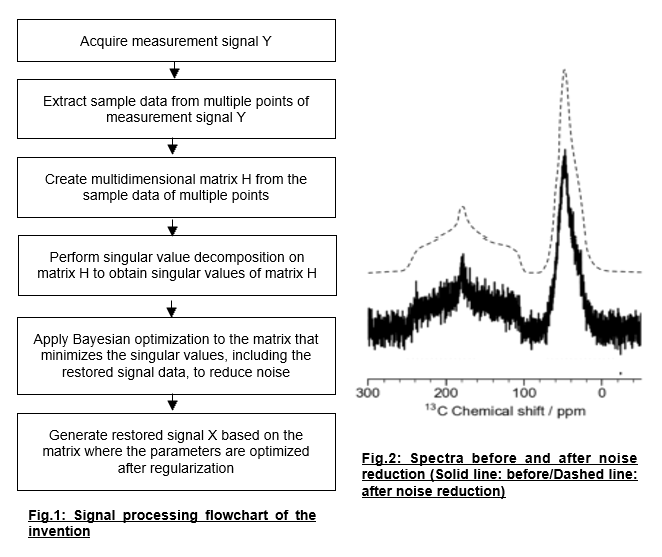Available Technologies
Noise Reduction Method
New noise reduction method that can reduce noise in NMR, MRI, ESR spectroscopy and time-resolved fluorescence spectroscopy using signal processing software
Background
During signal measurement, noise components are always present. In case of measurement with low sensitivity, such as solid-state nuclear magnetic resonance (solid-state NMR), noise contamination during measurement makes subsequent analysis difficult. In order to remove such noise components from measurement data and improve sensitivity in solid-state NMR, various methods has been proposed, including, equipment developments such as high magnetic fields using superconducting magnets, cryoprobes, magic angle spinning (MAS), and dynamic nuclear polarization (DNP), as well as pulse program developments like cross polarization (CP) and proton detection methods. However, equipment development faces the issue of high installation costs, and pulse program development has the limitation in applicable measurement methods and target nuclei.
Description and Advantages
Kyoto University researchers have discovered that by applying signal processing that combines singular value decomposition and Bayesian optimization to measurement signals containing Gaussian noise, it is possible to identify the principal components of the measurement data and reduce the noise components in the data (Fig.1).
⮚S/N ratio improved by 25 times after noise reduction
when the new method applied to the 13C chemical shift anisotropy (CSA) spectrum of glycine (Fig.2)
⮚Fewer accumulation counts are required
to obtain S/N ratio equivalent to the ones obtained with the currently available methods.

| Development Status |
・Confirmed the luminescence intensity within CSCs (Fig.1) ・High emission intensity was observed when co-stained with green fluorescent probe |
|---|---|
| Offer | ・Collaborative Research ・Patent License ・Option for Patent License |
| Related Links | View PDFView in Japanese |
Have you found what you were looking for?
- Interested in a particular research activity
- Cannot find the information
- Have questions on how to utilize research results
Feel free to contact us and get answers to your questions.
Inquiry- TLO-KYOTO
- Available Technologies
- Noise Reduction Method
3rd Floor, International Science
Innovation Building, Kyoto University
Yoshidahonmachi, Sakyo-ku, Kyoto
606-8501 JAPAN


